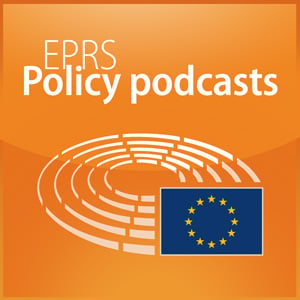Qualified majority voting in foreign and security policy: Pros and Cons
European Parliament - EPRS Policy podcasts
European Parliament Webmaster
4.8 • 13 Ratings
🗓️ 5 March 2021
⏱️ 7 minutes
🧾️ Download transcript
Summary
https://www.europarl.europa.eu/thinktank/en/document.html?reference=EPRS_BRI(2021)659451
https://youtu.be/aX2wstKIi6Y
Source: © European Union - EP
Transcript
Click on a timestamp to play from that location
| 0:00.0 | Welcome to the European Parliamentary Research Service Podcasts. |
| 0:06.0 | Today we'll be talking about the possibility of adopting decisions by qualified majority voting, |
| 0:12.0 | instead of by unanimity, in some areas of foreign and security policy, |
| 0:16.0 | analysing the pros and cons of such a move in the context of current security challenges. |
| 0:22.1 | So, keep listening. |
| 0:25.7 | The European Union wants to be a stronger world leader, but to be a global leader, it needs |
| 0:31.1 | to be able to act fast. And anyone following European affairs will know that getting 27 member |
| 0:36.9 | states with different geopolitical |
| 0:39.1 | interests, alliances and histories to agree on a common position is neither an easy process nor a quick |
| 0:45.9 | one. |
| 0:46.8 | But the crises and security challenges accumulating in and around the EU in recent years have |
| 0:52.5 | added to the urgency of having a more effective and |
| 0:55.6 | rapid decision-making process in foreign and security policy. |
| 1:00.0 | Over the past decade, qualified majority voting, which requires the approval of 55% of |
| 1:05.1 | member states, representing at least 65% of the EU population, evolved to be the standard |
| 1:10.8 | voting rule in the Council, replacing |
| 1:13.2 | unanimity in an increasing number of domains, from humanitarian aid and external border controls |
| 1:19.3 | to single market rules or climate targets. But member states are reluctant to give away |
| 1:25.2 | sovereignty when it comes to deciding on sensitive issues |
| 1:28.4 | such as foreign affairs and security. Indeed, many argue that such a rule undercuts the |
| 1:34.6 | bloc's bold ambitions for global influence, and it's difficult not to agree. Let's take |
| 1:40.9 | an example, the situation in Belarus in September 2020, when one small country, |
... |
Please login to see the full transcript.
Disclaimer: The podcast and artwork embedded on this page are from European Parliament Webmaster, and are the property of its owner and not affiliated with or endorsed by Tapesearch.
Generated transcripts are the property of European Parliament Webmaster and are distributed freely under the Fair Use doctrine. Transcripts generated by Tapesearch are not guaranteed to be accurate.
Copyright © Tapesearch 2025.

